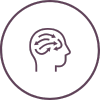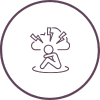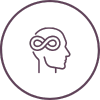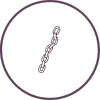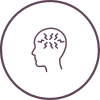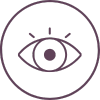Dual Diagnosis | Mental Health and Addiction
Dealing with addiction can be an uphill battle but when a co-occurring mental health disorder is also present, the situation becomes even more complex. Welcome to the world of dual diagnosis, where addiction and mental health challenges intertwine, creating unique challenges for sufferers and treatment providers alike. To meet these challenges, it is important to explore the prevalence of dual diagnosis, its intricate dynamics and how specialised treatment approaches can make a significant difference in recovery.
What is dual diagnosis?
Dual diagnosis, also known as co-occurring disorders, refers to the presence of both a mental health and addiction disorder in an individual. These conditions can be challenging to treat, as each disorder may feed into and exacerbate the other.
Some of the most common dual diagnoses include:
ADHD amd addiction
People with ADHD often struggle with impulsivity and difficulty regulating emotions, which may lead to substance abuse. Additionally, stimulant medications prescribed for ADHD can be habit-forming and may contribute to addiction. Click the button below to learn more.
Anxiety and addiction
Individuals with anxiety disorders may use substances to self-medicate, seeking temporary relief from their symptoms. However, substance abuse and the stresses of addiction often worsen anxiety, creating a vicious cycle. Click the button below to learn more.
Autism and addiction
People with autism spectrum disorder may be more susceptible to addiction due to social isolation, difficulty with emotional regulation, and increased sensitivity to stimuli. Substance use may provide a temporary escape from these challenges but can lead to addiction.
Bipolar and addiction
Individuals with bipolar disorder may use substances to cope with extreme mood swings, often leading to addiction. Additionally, substance use can trigger manic or depressive episodes, complicating daily life and making treatment even more difficult than usual.
Co-dependency and addiction
Codependency often involves enabling or being overly reliant on a partner with a substance use disorder. This dynamic can perpetuate addiction and make it difficult for both parties to seek help.
Depression and addiction
People suffering from depression may turn to drugs or alcohol to alleviate their symptoms, only to find that substance use worsens their condition. This can result in a self-perpetuating cycle of addiction and depression.
Personality disorder and addiction
Those with personality disorders may have difficulty forming healthy relationships and coping with stress. This can lead them to self-medicate with substances on which they ultimately become dependent.
Post Traumatic Stress Disorder and addiction
Individuals with PTSD often experience intense flashbacks, anxiety, and depression. They may use substances to numb their emotional pain, but this can lead to addiction. Click below to learn more.
Schizophrenia and addiction
People with schizophrenia may use drugs or alcohol to cope with hallucinations, delusions, or other symptoms. Substance abuse can exacerbate these symptoms and make treatment more challenging.
Why does dual diagnosis occur so frequently?
Dual diagnosis is a highly common phenomenon with one study finding that between 20-37% of those being treated for mental health conditions in community care and social settings also suffered from some form of addiction.
There are several reasons why it occurs so frequently:
- Self-medicating with drugs and alcohol for existing mental health disorders: Individuals may use substances to cope with symptoms of their mental health disorder, only to find that this creates a new problem – addiction – while also exacerbating the symptoms of the original condition.
- Developing an addiction to prescription mental health medication: Some medications prescribed for mental health disorders, particularly benzodiazepines and stimulants, can be highly addictive if misused.
- Chemical changes in the brain: Substance abuse and mental health disorders can both alter the brain’s chemistry, making it more challenging to differentiate and treat each condition.
- Trauma and stress: Traumatic experiences and chronic stress can contribute to both mental health disorders and addiction, as individuals attempt to cope with overwhelming emotions or memories.
Effective addiction treatment when a dual diagnosis is present
Treating dual diagnosis requires a tailored approach that addresses the addiction while taking into account the unique circumstances created by the co-occurring mental health disorder. However, it is first crucial to stabilise the mental health disorder before beginning addiction treatment as an untreated mental health condition can hinder progress in recovery.
Once this is done, many rehab treatment therapies have a positive knock-on effect on co-occurring mental health disorders and can actually address both issues simultaneously.
Here are some common addiction therapies that can benefit both addiction and co-occurring mental health disorders:
Cognitive behavioural therapy (CBT)
CBT is a goal-oriented therapy that helps individuals identify and change negative thought patterns and behaviours related to addiction and mental health disorders. It can help people to recognise self-defeating thoughts and replace them with more balanced perspectives, ultimately promoting healthier coping strategies and reducing the reliance on drugs to soothe or self-medicate for mental health issues.
Dialectical behaviour therapy (DBT)
DBT focuses on developing emotional regulation skills, distress tolerance and interpersonal effectiveness, which can be highly beneficial for people suffering from dual diagnosis. For example, a person with borderline personality disorder (the condition that DBT was originally developed to treat) and substance abuse might learn techniques to regulate intense emotions and reduce self-destructive behaviours, such as self-harm or drug use.
Motivational interviewing
This client-centred therapy aims to increase an individual’s motivation to change by addressing ambivalence and resistance which can be present in both addiction and mental health disorders. Conditions like anxiety can cause a person to put up barriers to change, but motivational interviewing can remind them of why they want to get better and allow them to make more informed decisions about their recovery.
Eye movement desensitisation and reprocessing (EMDR)
EMDR can help individuals process and integrate traumatic memories, reducing the impact of trauma on addiction and mental health disorders. A veteran with PTSD and alcohol addiction, for example, might use EMDR to reprocess traumatic memories, alleviating the need to self-medicate with alcohol.
Family therapy
Involving family members in the treatment process can help address relationship issues and codependency that may contribute to addiction and mental health disorders. For example, a couple in which one partner has a gambling addiction and depression which affects their relationships and home life in a negative way may benefit from family therapy to rebuild trust and establish healthy communication patterns.
Mindfulness-based therapies
Mindfulness- and meditation-based therapies teach individuals to be present and non-judgmental, promoting self-awareness and emotional regulation skills that can benefit both addiction and mental health disorders. Someone with an eating disorder and drug addiction, for example, might practise mindfulness meditation to cultivate self-compassion and reduce impulsive behaviours that are symptomatic of both conditions.
12-Step programmes
12-step programmes, both at Recovery Lighthouse and at addiction support groups, offer structure and guidance for individuals in recovery from addiction, while also addressing emotional and spiritual aspects that can impact mental health. For instance, a person with social anxiety and an addiction to prescription painkillers might attend Narcotics Anonymous meetings, where they can receive support from others who have faced similar challenges, practise interacting with other people and build a foundation for long-term recovery.
How to get help for dual diagnosis
If you or a loved one is struggling with dual diagnosis, know that help is available and recovery is possible. Recovery Lighthouse offers effective treatment for addiction that keeps co-occurring disorders in mind at every stage. Don’t wait any longer to reclaim your life – reach out to Recovery Lighthouse today for support, guidance and a path to a brighter future.




